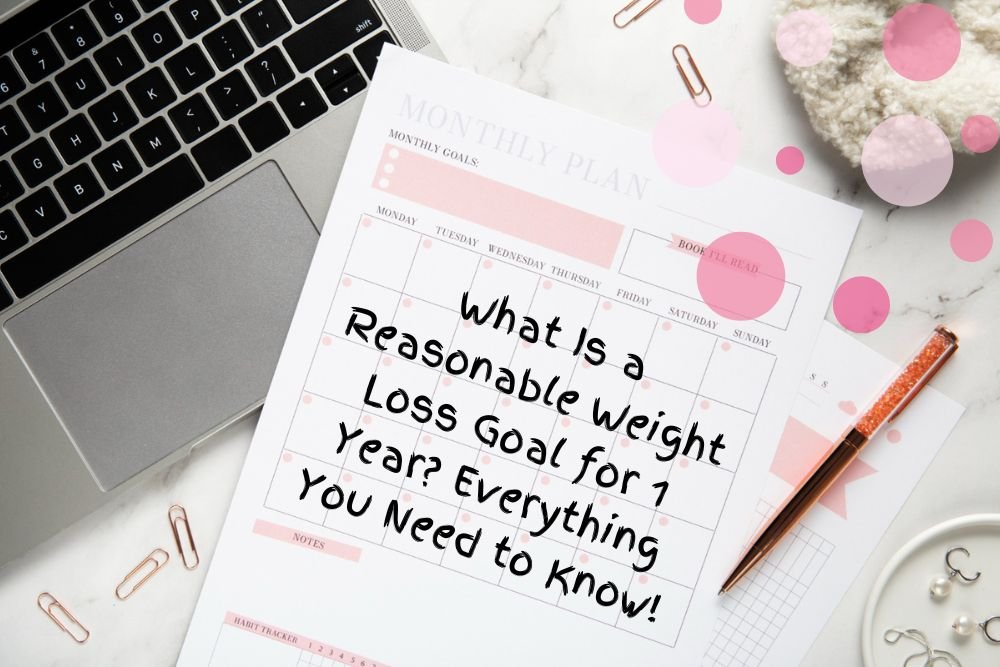Find out what is a reasonable weight loss goal for 1 year and learn how to make lasting lifestyle changes today.
Losing weight is a common goal for many, but setting a reasonable weight loss goal for one year can feel overwhelming.
With countless fad diets and miracle promises flooding the internet, how can you know what’s achievable and sustainable? Fortunately, science-backed guidelines offer clear direction to help you shed pounds in a healthy, effective way.
Table of Contents
What Is a Reasonable Weight Loss Goal for One Year?
Understanding the Science Behind Healthy Weight Loss
Experts recommend a weight loss rate of 1 to 2 pounds per week. Over the course of a year, this adds up to 50 to 100 pounds, depending on your starting point and dedication to the process.
This range aligns with recommendations from reputable health organizations, such as the CDC and Mayo Clinic.
Why is this range considered reasonable? Rapid weight loss might seem tempting, but it often leads to burnout, health risks, and weight regain. By aiming for gradual progress, you’re more likely to sustain your results while improving your overall health.
This completely changed how I feel every day—more energy, less fat, and so much motivation. Check it out!
How to Achieve Your Yearly Weight Loss Goal
Creating a Daily Caloric Deficit
The foundation of weight loss lies in creating a caloric deficit—burning more calories than you consume. To lose 1 pound, you need to cut approximately 3,500 calories.
Breaking this into manageable daily goals means reducing your intake by 500 to 1,000 calories each day.
There are two ways to achieve this:
- Dietary Adjustments: Replace high-calorie foods with nutrient-dense options, such as leafy greens, lean proteins, and whole grains.
- Increased Physical Activity: Incorporate exercises like brisk walking, swimming, or strength training to burn additional calories.
By combining both approaches, you can create a sustainable calorie deficit without feeling deprived.
Example Tips to Create a Deficit
- Swap sugary beverages for water or unsweetened tea.
- Add 30 minutes of cardio to your daily routine.
- Focus on portion control during meals.
Losing weight and staying motivated was always hard—until I found this. Check it out!
The Importance of Sustainable Changes
Short-term fixes like fad diets may deliver quick results, but they rarely work long-term. Instead, successful weight loss involves adopting sustainable lifestyle changes.
Dietary Habits for Long-Term Success
- Prioritize balance: Fill your plate with fruits, vegetables, lean proteins, and healthy fats.
- Practice mindful eating: Chew slowly, savor flavors, and stop eating when satisfied.
Exercise for Life
Consistency is key. Find activities you enjoy, whether it’s yoga, cycling, or dancing, to stay motivated and committed over the long term.
Setting Initial Weight Loss Targets
For beginners, aiming to lose 5% to 10% of your body weight within the first few months is an achievable starting point. For instance, if you weigh 200 pounds, setting a goal to lose 10 to 20 pounds initially can significantly improve your health.
This small, manageable target boosts your confidence and reduces risks associated with obesity, such as high blood pressure and diabetes.
Once you’ve reached your initial goal, you can reassess and aim for further progress.
A simple way to lose fat, stay motivated, and get energized? Yes, it exists—click here to find out!
Tracking Your Progress
Why Tracking Matters
Keeping tabs on your progress is essential for staying motivated. Research shows that individuals who regularly monitor their weight and food intake are more likely to succeed in their weight loss journey.
Tracking Methods
- Journaling: Write down your meals, workouts, and feelings to identify patterns.
- Apps: Tools like MyFitnessPal or Lose It! make tracking simple and intuitive.
By measuring progress, you’ll have a clearer sense of what’s working and where you need to adjust.
Overcoming Common Challenges
While the process is rewarding, it’s not without obstacles. From plateaus to emotional eating, challenges are inevitable. Here’s how to tackle them:
Hitting a plateau is frustrating but normal. Over time, your body adjusts to your routine, slowing progress. To overcome this:
- Increase workout intensity.
- Experiment with new exercises.
- Reassess your caloric intake.
Managing Emotional Eating
Stress, boredom, or sadness can lead to overeating. Combat emotional eating by:
- Recognizing triggers.
- Practicing stress-relief activities like meditation.
- Keeping healthier snacks on hand.
Finally, a way to feel great and lose weight naturally. Learn more about it today!
The Long-Term Benefits of Gradual Weight Loss
Physical Health
Gradual weight loss reduces risks for chronic conditions, including heart disease, diabetes, and joint pain. It also boosts energy levels and improves sleep quality.
Mental and Emotional Health
Losing weight at a steady pace fosters self-confidence and creates a positive relationship with food and fitness. This mindset shift increases the likelihood of maintaining your results.
Conclusion: What Is a Reasonable Weight Loss Goal for 1 Year
Setting a reasonable weight loss goal for one year is not about perfection—it’s about progress. By committing to small, sustainable changes, you can achieve meaningful results that improve both your health and quality of life.
Remember: gradual weight loss isn’t just effective—it’s the key to lasting success. Start today, and a healthier, happier you is within reach!





